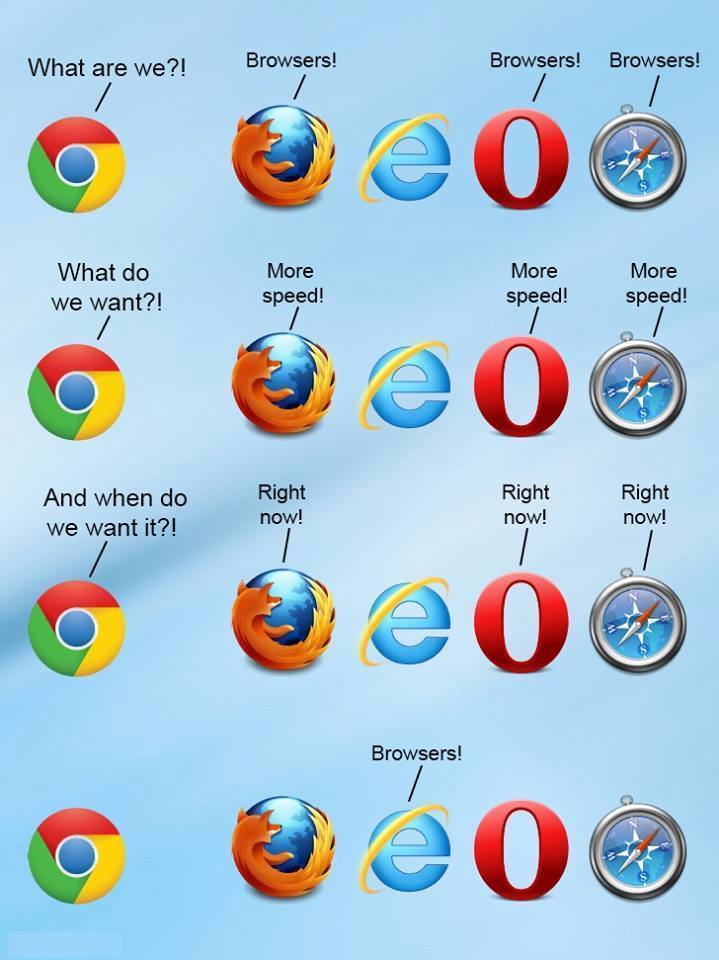Official Everybody Edits Forums
Do you think I could just leave this part blank and it'd be okay? We're just going to replace the whole thing with a header image anyway, right?
You are not logged in.
- Topics: Active | Unanswered
#26 2015-09-24 12:44:05
- Hexagon
- Member
- Joined: 2015-04-22
- Posts: 1,213
Re: Best browser? tip: not chrome
JadElClemens wrote:Thing is, Firefox isn't great about following my GTK theme either. Fact is, it doesn't. At all. Chrome at least uses the proper colors and icons.
Hold on I've got a thing for that I'll see if I can find it somewhere. It still won't use the icons but at least the color scheme will be right.
I find the same (the GTK theme isn't really "respected" by firefox.) Also, Chrome has the ability to switch between Chrome's native color scheme and the GTK, which is really nice.
Offline
#27 2015-09-24 21:27:18
- 0176
- Member

- From: Brazil
- Joined: 2021-09-05
- Posts: 3,174
Re: Best browser? tip: not chrome
Stuff like "bullying cpu" or "ram hog" makes me more concerned for how bad your PC is. I thought those were a thing of the past.
I use Chrome in for general browsing because it's fast/smooth/minimalistic, I use FF for EE because pepper flash sucks. It feels more sluggish for general browsing to me.
I know those are terms that sound really dumb for someone who knows even a little bit about technology nowadays, and using "too much" RAM doesn't matter at all most of the time. But with only 4GB of RAM (needing a upgrade soon) and Steam games running in the background I just felt awkward using Chrome for some reason, and hell sometimes it even took too long to load a single tab. I doubt Firefox and Chrome would have any really noticeable difference in that case anyway, but yeah.. I guess I can't stand the Chrome theme either.
Offline
#28 2015-09-24 22:36:36
- Master1
- Member

- From: Crait
- Joined: 2015-02-15
- Posts: 4,452
Re: Best browser? tip: not chrome
All I use nowadays is chrome. tbh I don't really care if it's the best or not, it's just what I'm used to.
On my old computer however, chrome never seemed to work well with EE, so I used Opera.



Offline
#29 2015-09-24 22:47:48
- Abelysk
- Guest
Re: Best browser? tip: not chrome
Chrome > Firefox. The speed of Chrome is triumphant.
- Wooted by:
#30 2015-09-25 02:36:23
- some woman
- Member

- From: 4th dimension
- Joined: 2015-02-15
- Posts: 9,289
Re: Best browser? tip: not chrome
chrome is fast and pop-up free
firefox is a little faster but has no protection against pop-ups
10 years and still awkward. Keep it up, baby!
Offline
#31 2015-09-25 04:02:15
- capasha
- Member

- Joined: 2015-02-21
- Posts: 4,066
Re: Best browser? tip: not chrome
chrome is fast and pop-up free
firefox is a little faster but has no protection against pop-ups
I don't get any popups with Firefox. Maybe it's you that fail at using it?
Offline
#32 2015-09-25 04:27:17
- !nb4
- Formerly AYB

- From: New In Package (NIP) Pole
- Joined: 2015-07-18
- Posts: 767
Offline
#33 2015-09-25 06:28:04
- Different55
- Forum Admin

- Joined: 2015-02-07
- Posts: 16,577
Re: Best browser? tip: not chrome
I don't care people. Depends on which type of computer you have. I use firefox btw. Topic closed its enough.
If you don't care, what are you doing posting in here?
At the moment I'm using firefox but up until recently I had been using chrome. Can't remember why I switched but it's probably because chrome is a botnet. I don't really like firefox either but I don't know what else to use. Everything's either gecko-based or chromium-based or sucks worse than both.
I guess Vivaldi's pretty alright for a chromium browser but it doesn't feel quite ready yet. I like where it's headed so far, though. Super customizable already and it has gestures and panels with the notes which are basically all my favorite features from Opera 12 that I haven't been able to replace on any other browser (well, there are gestures extensions for firefox and chrome but they're not always the best quality).
And I sort of want to like Sleipnir so I can be edgy and different but I just don't like its tabs and it also works badly on weak computers. The thumbnail tabs are supposed to make it easy to see what's in each tab but they're tiny and when you have tons of forum tabs open that all look the same then you end up having to mouse over each of them to find the one you're looking for. I liked the mobile version better but I don't think it had text wrapping which is basically a requirement for any mobile browser I use.
Right now I think I'm mainly torn between firefox being a nice functional browser and vivaldi being so similar to the old opera 12 that I stuck with for so long.[/wall]
"Sometimes failing a leap of faith is better than inching forward"
- ShinsukeIto
Offline
#34 2015-09-25 17:32:14
- 0176
- Member

- From: Brazil
- Joined: 2021-09-05
- Posts: 3,174
Re: Best browser? tip: not chrome
AYB wrote:I don't care people. Depends on which type of computer you have. I use firefox btw. Topic closed its enough.
If you don't care, what are you doing posting in here?
At the moment I'm using firefox but up until recently I had been using chrome. Can't remember why I switched but it's probably because chrome is a botnet. I don't really like firefox either but I don't know what else to use. Everything's either gecko-based or chromium-based or sucks worse than both.
I guess Vivaldi's pretty alright for a chromium browser but it doesn't feel quite ready yet. I like where it's headed so far, though. Super customizable already and it has gestures and panels with the notes which are basically all my favorite features from Opera 12 that I haven't been able to replace on any other browser (well, there are gestures extensions for firefox and chrome but they're not always the best quality).
And I sort of want to like Sleipnir so I can be edgy and different but I just don't like its tabs and it also works badly on weak computers. The thumbnail tabs are supposed to make it easy to see what's in each tab but they're tiny and when you have tons of forum tabs open that all look the same then you end up having to mouse over each of them to find the one you're looking for. I liked the mobile version better but I don't think it had text wrapping which is basically a requirement for any mobile browser I use.
Right now I think I'm mainly torn between firefox being a nice functional browser and vivaldi being so similar to the old opera 12 that I stuck with for so long.[/wall]
Weren't you this forum's official Opera salesman a few years ago? What happened?
Offline
#35 2015-09-25 18:31:37
- Different55
- Forum Admin

- Joined: 2015-02-07
- Posts: 16,577
Re: Best browser? tip: not chrome
Different55 wrote:AYB wrote:I don't care people. Depends on which type of computer you have. I use firefox btw. Topic closed its enough.
If you don't care, what are you doing posting in here?
At the moment I'm using firefox but up until recently I had been using chrome. Can't remember why I switched but it's probably because chrome is a botnet. I don't really like firefox either but I don't know what else to use. Everything's either gecko-based or chromium-based or sucks worse than both.
I guess Vivaldi's pretty alright for a chromium browser but it doesn't feel quite ready yet. I like where it's headed so far, though. Super customizable already and it has gestures and panels with the notes which are basically all my favorite features from Opera 12 that I haven't been able to replace on any other browser (well, there are gestures extensions for firefox and chrome but they're not always the best quality).
And I sort of want to like Sleipnir so I can be edgy and different but I just don't like its tabs and it also works badly on weak computers. The thumbnail tabs are supposed to make it easy to see what's in each tab but they're tiny and when you have tons of forum tabs open that all look the same then you end up having to mouse over each of them to find the one you're looking for. I liked the mobile version better but I don't think it had text wrapping which is basically a requirement for any mobile browser I use.
Right now I think I'm mainly torn between firefox being a nice functional browser and vivaldi being so similar to the old opera 12 that I stuck with for so long.[/wall]
Weren't you this forum's official Opera salesman a few years ago? What happened?
Opera 15 happened. It wasnt even the same browser after that. It stopped being a browser for power users and started being another generic chromium based browser. No notes, no gestures (at first), no email, no IRC, no decent theming, no anything that was great about opera. I kept using the old version for a long time but it's beginning to break down in small ways. That's why I think Vivaldi is nice. It's how opera should have handled the transition to being based on chromium.
"Sometimes failing a leap of faith is better than inching forward"
- ShinsukeIto
Offline
#36 2015-09-25 19:00:37, last edited by Abelysk (2015-09-25 19:01:57)
- Abelysk
- Guest
Re: Best browser? tip: not chrome
IE 11 — the oft overlooked Microsoft standby — is being replaced by Edge, a lean browser for Windows 10. Mozilla Firefox and Opera continue to ramp up their version numbers, and Safari tenaciously scuttles along as the under-appreciated byproduct of Apple’s quest for global domination.
You can’t really go wrong with any of the popular browsers, but there are a few things here and there that give each its own competitive edge.
Installation, updates, and compatibility
Installation across the five browsers is basically the same. Users can download them from their respective websites if they aren’t built into your operating system already (i.e. Safari comes preinstalled on Mac OS X, Edge on Windows 10, And IE on all previous versions of Windows), and each will typically download in under 30 seconds depending on your Internet connection.
Below is a list of browser compatibility.
Google Chrome: Windows, Mac OS X, and Linux
Mozilla Firefox : Windows, Mac OS X , and Linux
Internet Explorer (32 and 64-bit): Windows
Safari: Mac OS X, Windows (no longer updated)
Opera: Windows, Mac OS X, and Linux
Edge: Available with Windows 10
When it comes to updates, Opera, Firefox, and Chrome have the advantage. They install silently, quickly, and transparently download updates in the background and automatically apply the new software when you relaunch the programs. What’s more, the third-party browsers update most frequently, every few weeks, so any major problems are likely to be fixed quicker than with IE and Safari. It’s too soon to say how frequently Microsoft will update Edge.
Users can also manually install updates on Firefox if they would like to have greater control over the browser or prefer to use an older version for whatever reason. Keep in mind that turning off automatic updates is more likely to put your computer at risk, though, since each browser is continuously adding security fixes and other key stability updates.
Design and ease of use
If we didn’t know better, we’d say that the current trend in browser design is for the browser to disappear entirely. IE, Edge, Firefox, Safari, and Chrome all attempt to be as minimal as possible, offering next to no actual text and small, monochromatic buttons that discretely blend with the aesthetic design of operating systems like Windows 8 and Mac OS X. Overall, all five browsers appear to achieve their goals fairly well. Below we compare and contrast browser design.
Google Chrome
Google Chrome: Chrome has a lean address bar configuration, stripping everything down into a simple tab layout and address bar configuration that also doubles as a search bar Google calls the “Omnibox.” Like most browsers, the window can get incredibly cramped with 15+ tabs open, but it still does a fantastic job of delivering content whether you have the browser fully expanded or slightly minimized for the sake of space.
Adjacent to the omnibox is Chrome’s simple standard navigational features (i.e. back, forward, refresh, home) by default, but you can easily slim down the window by customizing the toolbar and deleting any buttons you deem pointless. Chrome’s single-click bookmarking method, done by simply clicking the star located on the right side of the address bar, also makes bookmarking your favorite webpages a breeze and hassle-free experience.
Firefox
Mozilla Firefox: This browser features a similar, yet more useful layout when compared to its competitors, placing the tab bar above the address bar. Despite reaching version 40 of the software (it skipped versions 18 and 11 through 16, apparently), it still feels like the bulky predecessors of the software, refusing to unite the address and search bars in a single unified field like all of its peers.
However, this is more of an aesthetic issue than a functional one — you can search within the address bar or the accompanying search bar to its right. The browser offers the same kind of single-click bookmarking that Chrome does — all you have to do is click the star located to the right of the search bar — but there isn’t much else that separates it from the rest of the pack. The settings menu is accessible in a similar fashion to that of Google Chrome, allowing you to access various options by clicking a simple button depicting three horizontal bars located in the upper-right corner of the window. Unfortunately, it also takes up a bit of space that could otherwise be used by the tab bar.
Internet Explorer 11
Internet Explorer: Technically, IE 11 is the most minimal Internet device of the four, with less “chrome” than Chrome. IE 11 features a single bar that simultaneously functions as the browser’s address and search bar. The space at the top places your open tabs to the right of the address-search bar, making it somewhat more cluttered than some of our other picks given the amount of space the search field takes up, but it typically isn’t worrisome unless you’re really stacking up a high volume of tabs. Other notable design features include the single-click bookmarking star now widely adopted by almost all other prominent browsers.
The two decade old browser is being phased out to make way for Microsoft’s newest browser, Edge. IE is still available in Windows 10, but is not the default and will not receive new features.
Safari 8
Safari: The browser that has traditionally attracted criticism is now a serious competitor to the likes of Google and Firefox. The newest version of Apple’s browser is fairly minimalist in design, but retains enough familiarity for old users of the browser to feel at home. Like its peers, Safari offers the address-search bar hybrid. Updates to Safari 8 include a share icon embedded to the right of the search field. The sharing feature serves as a way to bookmark pages, post to social networks, and share via native Apple platforms (iMessage, Mail). The updated Safari is worth a shot for any OS X users. Mac users running the most recent operating system can even launch the browser in full-screen mode, essentially expanding the window and for the ultimate viewing experience.
Opera
Opera: This browser embraces Google’s chromium Web engine while retaining signature features that distinguish the browser from the rest. Opera has a single hybrid address-search bar like Chrome, but the alternative browser also sports Opera’s signature features, stash and speed dial. Speed dial allows for easy bookmarking and functions like “the most visited page” on Safari. Stash is similar to Pocket, allowing you to quickly store pages for future browsing. The bottom line, it’s a clean design with innovative features that holds its own against the rest of the competition.
Edge
Edge: Edge resembles IE 11, though with even smaller borders, fewer icons, and a streamlined toolbar designed to take up more real estate on your display than IE 11. A solitary, address-search bar will also run the width of the page, as well as a trio of headline features that include markups, reading view, and Microsoft’s equivalent to Siri (aka Cortana). It is the standard web browser for Windows 10, and has integration with many of the OS’s features and apps, including Cortana and Outlook.
Benchmark Tests Compared
Most browsers are compatible with Web standards and handle speed with relative ease. A casual user probably won’t notice a difference in the Web page rendering speed between browsers. All five browsers are much faster and leaner than the browsers of a few years ago and become even more so with each new build.
Google Chrome bested the HTML5 compliance benchmark, and the test that indicates how “future-forward” a browser is, as well as Sunspider and Octane 2.0, which measures how your browser will perform under the weighted stress of gaming or highly-interactive webpages.
Chrome was outpaced in two tests; IE, though ranking rather low in the HTML 5 Compliance benchmark test, performed remarkably well in the Kraken JavaScript benchmark, a test that measures rendering time. Safari did very well in the JavaScript-based benchmarks, but not as well in combined and HTML5 benchmarks.
The second of Microsoft’s web browsers, Edge was faster when running the Sunspider benchmark than its older counterpart, and it proved surprisingly efficient in regards to Octane 2.0. Like IE, it stumbled in regards to HTML5 — though, it still scored higher than its predecessor, which seems appropriate.
Extras
Features are what truly separate one browser from the next given that speed and compatibility are no longer really an issue. That being said, each browser does have its own slate of differentiating features, from expansive app stores and add-ons to various extensions and tools, that makes it shine in its own light.
Chrome differentiates itself through its constant updates, but also through its extensive Web Apps Store, which offers apps that blur the line between Web and local apps in some unique ways. Much of this philosophy comes from Chrome OS, Google’s desktop operating system based on the Chrome browser. Still, we like the idea and Chrome remains the most integrated software for accessing anything Google related (i.e. Gmail, Google Drive). If Web apps and seamless dashboard features are important to you, check out what Google has to offer.
Check out the mobile versions for Android and iOS devices while you’re at it.
Like Chrome, Firefox is on a six-week update schedule, and sports a strong catalog of extensions. Developers will have to retool many of these to support the newest Firefox iteration, but some users refuse to leave Firefox solely because it offers unique extensions that have become essential to their browsing experience. Most other browsers support add-ons, but Firefox may have a lead in mindshare here (for now). The built-in PDF viewer is incredibly handy, as is the browser’s support for Macbook Retina displays and grouped tabs, and Firefox remains the most customizable in terms of interface and display out of the five on our list.
Currently, Firefox only offers a mobile version of its browser for Android devices.
Safari may not have the admirable extension catalog to rival its peers, but it does have offer a good deal of extensions and utilities for productivity and organization. Unlike Firefox and Chrome, though, the third-party extensions are rather bland and aren’t as integrated into the software as they probably could be. The bulk of them also lack the “fun” factor found on other browsers, but hopefully Apple will take a cue from the current market and work more accessible and entertaining extensions into the Safari Extensions Gallery. Other awesome built-in extras include the ad-free Safari Reader, which lets you view solely text without all the unnecessary clutter, and comprehensive iCloud integration for syncing pages across all your devices.
Safari’s mobile version comes preinstalled on iOS devices.
IE11 sports heavy integration and optimization for Windows 7 and 8. Many functions, like turning tabs into new windows, are much easier with Microsoft’s new browser. It retains some of the unique features introduced in IE10, like individual tab previewing from the task bar and a new feature called site pinning, which lets you ‘pin’ a website to the Windows 8 task bar like you would a normal application. However, unlike an ordinary taskbar shortcut, pinned websites can offer customized “right click” menus. For example, pinning the Facebook toolbar will let you right click and auto browse to different sections of the Facebook site like News, Messages, Events and Friends. In addition, when you open a pinned site, the IE11 browser customizes itself to resemble the site you’re viewing. Currently, this only means the icon in the upper-left corner will change along with the colors for the back and forward buttons, but we like the idea.
IE’s mobile version comes preinstalled on Windows devices.
Creating a browser that can compete with the browser giants is an an uphill battle for Opera. That said, the decision to embed Chromium has proven to pay dividends for the Scandinavian company. Opera’sadd-ons library utilizes Chrome’s major apps, including mail and pocket. Thankfully, Opera doesn’t attempt to beat Google at its own game. Sure, the extensive Web-app store offers a variety of mostly-free apps, but Opera’s extensions are centered around the browser’s signature tool, Speed Dial — a touchscreen-optimized homepage. Each extension can be tacked to Opera’s Speed Dial homepage. The simplicity of having your Gmail account stored next to a dependable news aggregatior on your homepage is hard to pass up.
Opera offers mobile versions for Android, iOS, and Windows devices.
At this point, Edge doesn’t offer any extensions. However, extensions have proven to be more than just a niche feature given their wide-spread adoption in other browsers. Microsoft has confirmed that Edge will support extensions in one capacity or another, but there’s no word on what exactly that will entail as of yet. However, Edge does offer an attractive an easy to use reader mode, that removes clutter and formatting from web pages and articles to make for comfortable reading on the web.
Security and Privacy
The most valuable tool for secure browsing is user discretion. Every browser has encountered security broaches in the past. And Internet Explorer and Chrome’s reputation for protecting users’ security and privacy credentials is spotty at best.
Chrome, Safari, and Firefox rely on Google’s Safe Browsing API to detect potentially dangerous sites. Thanks to constant updates, Mozilla, Chrome, and Opera all make constant security updates. But Chrome takes security a bit further by also scanning for potentially harmful downloads. There’s also encryption ad-ons currently in the works at Google.
All browsers offer a private session option, too. Private sessions prevent the storage of history, temporary Internet files, and cookies. For example, Internet Explorer 11 features a security measure called Do Not Track. Only Internet Explorer goes so far as to to block trackers completely from communicating with your browser. What’s more, according to a 2013 NSS study, only Internet Explorer blocks trackers used on more than 90 percent of potentially hazardous sites.
Nonetheless, Microsoft has stated that Edge won’t offer IE’s Do Not Track feature, though you will be able to enable some tracking protection. This change of heart is because Do Not Track isn’t honored by many websites, including Facebook and Google.
Popularity
According to the latest numbers from StatCounter, Chrome was the top browser for March 2015, garnering nearly 50 percent of the global browser market share and further solidifying its spot as top dog. IE and Firefox continue to be popular, holding roughly 18.06 and 17.96 percent, respectively, but both seem to be leveling out. Safari and Opera round off the top five, fixed at around 10 percent and 1.7 percent, respectively. On the mobile side, Chrome wins out with a staggering 31.52 percent, but Opera’s touch-screen optimized browser holds an impressive mobile browser market share at 8.4 percent. Mobile incarnations of Safari and IE jostle for supremacy with significantly lower shares. Edge is too new to be on the list.
Which browser is best?
For now, Chrome remains the best browser on the market. Google’s proprietary browser boasts the largest and most useful selection of apps and extensions, along with a frequent update schedule.
Other browsers, however, are upping their game. Opera and Firefox now offer a similar update frequency and IE 11 outperforms Chrome on Sunspider’s benchmark standards. Then there’s Spartan, which could become a contender when Windows 10 is released.
The bottom line is this, we’re in an era where the most minimal and modular browser reigns supreme. Chrome remains the most nimble and most app-ready browsing experience. IE/Spartan, Firefox, and Opera have narrowed their lead significantly, each offering new features to better accommodate the needs of some users.
- Wooted by: (3)
#37 2015-09-25 20:38:45
- Kikikan
- Member

- From: Hungary
- Joined: 2015-08-10
- Posts: 204
Re: Best browser? tip: not chrome
I don't know why everyone hates Chrome this much. I mean, yes it's running in not only 1 process, and it needs a bit more RAM than the other browsers, and there is no NPAPI, but PPAPI (so the flash games still working). It's running smoothly and I had no problems with it. I remember once, on YT I clicked on the replay button and my new computer got BSOD. (This isn't a joke)
Offline
#38 2015-09-26 01:19:28
- Abelysk
- Guest
Re: Best browser? tip: not chrome
Adobe Flashplayer still works on my Chrome... Is that normal
#40 2015-09-26 03:45:05
- JadElClemens
- Member
- From: Colorado, USA
- Joined: 2015-02-15
- Posts: 4,559
Re: Best browser? tip: not chrome
Adobe Flashplayer still works on my Chrome... Is that normal
Yup. Same here.

I hate tall signatures.
Offline
#42 2015-09-26 13:04:52
- 0176
- Member

- From: Brazil
- Joined: 2021-09-05
- Posts: 3,174
Re: Best browser? tip: not chrome
Hey, quick question here, Am I the only one who has their Flash crashing when using any microphone or webcam application in-browser, for example in vocaroo.com?
Offline
#43 2015-09-26 16:45:43
- Different55
- Forum Admin

- Joined: 2015-02-07
- Posts: 16,577
Re: Best browser? tip: not chrome
Hey, quick question here, Am I the only one who has their Flash crashing when using any microphone or webcam application in-browser, for example in vocaroo.com?
Never happened to me. Maybe uninstall and reinstall it unless you're using chrome in which case that wouldn't do any good because it packages in its own version of flash that it calls pepperflash so maybe uninstall and reinstall chrome then.
"Sometimes failing a leap of faith is better than inching forward"
- ShinsukeIto
Offline
#44 2015-09-27 07:28:03, last edited by Br0k3n (2015-09-27 07:28:16)
- Br0k3n
- Member

- From: Serbia
- Joined: 2015-04-04
- Posts: 1,451
Offline
#45 2015-09-27 21:33:09
- skullz17
- Member

- Joined: 2015-02-15
- Posts: 6,699
Re: Best browser? tip: not chrome
0176 wrote:Hey, quick question here, Am I the only one who has their Flash crashing when using any microphone or webcam application in-browser, for example in vocaroo.com?
Never happened to me. Maybe uninstall and reinstall it unless you're using chrome in which case that wouldn't do any good because it packages in its own version of flash that it calls pepperflash so maybe uninstall and reinstall chrome then.
diff what do you have against separating your clauses

thx for sig bobithan
Offline
- Wooted by:
#46 2015-09-27 22:07:54
- JadElClemens
- Member
- From: Colorado, USA
- Joined: 2015-02-15
- Posts: 4,559
Re: Best browser? tip: not chrome
Different55 wrote:0176 wrote:Hey, quick question here, Am I the only one who has their Flash crashing when using any microphone or webcam application in-browser, for example in vocaroo.com?
Never happened to me. Maybe uninstall and reinstall it unless you're using chrome in which case that wouldn't do any good because it packages in its own version of flash that it calls pepperflash so maybe uninstall and reinstall chrome then.
diff what do you have against separating your clauses
#ROASTE
D

I hate tall signatures.
Offline
- Wooted by:
#47 2015-09-27 22:25:02
- Jabatheblob1
- Member
- Joined: 2015-03-01
- Posts: 856
Re: Best browser? tip: not chrome
Tor. Best browser na
If you would like me to make a bot for you, go here.
Offline
- Wooted by:
#48 2015-09-28 19:50:55, last edited by Nebula (2015-09-28 19:53:57)
- Nebula
- Guest
Re: Best browser? tip: not chrome
Using the Firefox. The 1st Browser in top 10. But he didn't load some pictures in forums and he didn't load some pages. (On Windows 10 because othere systems was working pages on browser and pictures on forum).
Yandex is my alt. Works everywhere.
Woot if you love Firefox.
#49 2015-09-28 21:00:38
- blizzard
- Member
- Joined: 2015-02-15
- Posts: 556
Re: Best browser? tip: not chrome

Offline
- Wooted by: (5)
[ Started around 1747651544.8025 - Generated in 0.118 seconds, 13 queries executed - Memory usage: 1.86 MiB (Peak: 2.15 MiB) ]

